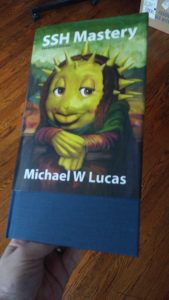So, I wrote a book. And I didn’t tell people what it is.
The book is now out. You can buy it.
And it has an authentic, legit blurb from Ken Thompson, co-creator of Unix.
Explaining why I did it this way takes a little bit of context.
First:
People have sent me all kinds of guesses for the book topic. Some of you have guessed correctly. I haven’t told anyone that they’re correct, though. You people are perfectly capable of launching a dictionary attack on me, so the only answer I could give is “no.”
Mind you, some of those “nos” have been carefully phrased so that you’d interpret them as a “no,” when really they’re a “maaaaybe” or even a “yes, but I’m not going to admit it.” If someone guessed correctly I used answers like “I wish,” the unspoken second half is “and I’m self-publishing, so I have the power to make my wishes come true.” Or perhaps “I long to one day be sufficiently knowledgeable to write this book.” Technically accurate but certainly misleading statements.
I’m prepared to hide wildly behind those technicalities.
Second:
I’ve thought for a while that there’s space in the market for even smaller books than my usual Mastery titles. This is a test run of producing such a book. It’s half the size of my sudo, Tarsnap, and DNSSEC books for a reason. It’s also less expensive.
Third:
As I was writing up my 2017 year-end review I realized that the next book I wrote would be the 13th Mastery book. 13 is my lucky number, because what other number could be? I’d like to write four tech books this year, so that’s one every three months.
Looking at the calendar, I realized that quarterly releases would put me at April First.
Could I write and release the 13th Mastery book as an April Fool’s prank?
Except have it not be a prank? Have it be a serious tech book, on a real program, that solves actual problems in the real world?
Maybe.
Maybe I could. Three months for writing, tech review, copyedit, and production is danged aggressive, but it should be doable. And nothing concentrates my mind like an unbreakable deadline and the looming possibility of public humiliation.
I warned the sponsors. Dozens of you sponsored anyway. I’m torn between apologizing and posting an “I told you so” GIF.
Fourth:
Every so often, I get a cluster of emails complaining about my using both male and female third person pronouns in my tech books. Either women don’t belong in tech, or shouldn’t be in tech. A few offer arguments that “he” is gender-neutral in English. All of these emails include misogynistic statements of one form or another.
These emails arrive in groups. I hear nothing for months, and then four or five appear in the space of twenty-four hours. I suspect that my work comes up on some MRA message board or IRC channel and a few of the people hanging out there decide to present their case.
Overwhelmingly, these messages display the combination of sloppy logic and total lack of understanding of human nature that seems to be a hallmark of a certain fringe of techies. Indeed, they show a failure to understand what it means to be human, or what it means to live in a liberal society.
I delete these messages as soon as I realize what they’re about. Most often, I don’t make it past the first paragraph. (Many times the email is thousands of words in a single paragraph, and I wouldn’t finish reading that anyway.) I do offer an answer in my blog, but this project game me an opportunity to respond more… usefully.
So, for the record: I mix male and female pronouns for a reason. Women are a thing.
I also use the singular they. It’s been valid since Shakespeare’s day, and it’s a pronoun for some people. If you think the singular they is ruining our language, you’re wrong; English was ruined long before you or I got here. (It’s fine for you to not like that pronoun, but that’s your taste. I write my books to my taste. My taste includes the panoramic, painful panoply of our abominable tongue.)
If we had different pronouns for different races, I’d use them.
If we had different pronouns for different faiths, I’d use them too.
Tech is a diverse field and needs to become more diverse. Doing otherwise is disrespectful, dehumanizing, and a shameful waste of human potential. (Go read your Adam Smith, and not just the libertarian-friendly bits about the awesomeness of the free market.)
Everyone deserves to see themselves reflected in books. When writing fiction I work to make my female characters just as utterly screwed-up or as completely pig-headed and smart as my male characters. I can’t imagine doing otherwise in nonfiction.
Does this make me a feminist? To the people who write these emails, certainly. But a proper feminist would hear me saying “women are a thing” and tell me that “women are not things.” Like “firewall,” I’m not sure what the word “feminist” means today. I want to see female schmucks promoted just as quickly as male schmucks. I want everybody, including women, to no longer need to fear verbal or physical assault. If that’s your definition of feminist, fine, slap it on me. I’m gonna keep doing my thing.
Fifth:
Writing is a business.
I’m a businessman.
And if there’s a market, I should serve it.
#mwlSecretBook comes in two editions. They’re differentiated by third person singular pronouns. Any third person singular pronouns that appear in the standard edition, for normal people, are feminine. Any third person singular pronouns in the special “Manly McManface” edition are masculine. That’s a much smaller market, however, so the Manly McManface edition is much more expensive, because economics.
(Remember, book 13. 1 April. When else could I do this?)
Sixth:
Soroptimist International of Grosse Pointe does a lot of work in the Detroit area. They raise money for women’s scholarships. They fight human trafficking. They support domestic violence shelters that help hundreds of women a year. My wife is a member. These ladies work damn hard.
For each copy of the Manly McManface edition sold, print or ebook, I will donate one dollar to SIGP.
Should you buy that expensive edition to make me donate money? Nah. It’s more effective for you to donate directly. You should only buy that edition if you’re too weak to tolerate women existing in your life.
Seventh:
Presented for your consideration, at long last: (drum roll) (more drum roll) (eye roll) (blare of trumpets) #mwlSecretBook! (fireworks) (children’s chorus) (shrieks of disappointment)
It’s available in ebook as I publish this blog post. Print will be coming in the next couple of days.
PS: I moderate comments with a heavy hand. If you’re offended that I created a book just for you, chances are I’ll either delete your comment or mock you.




